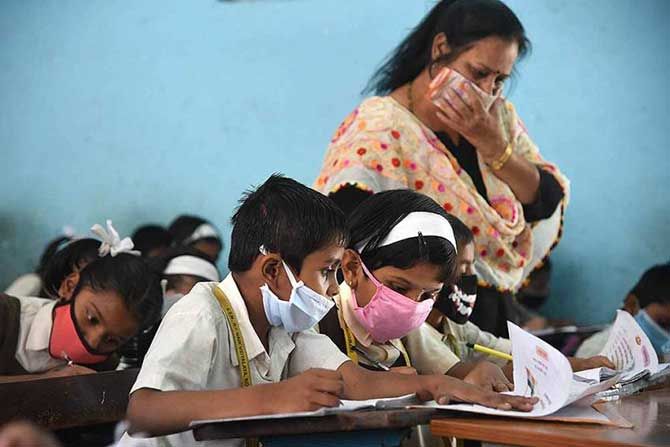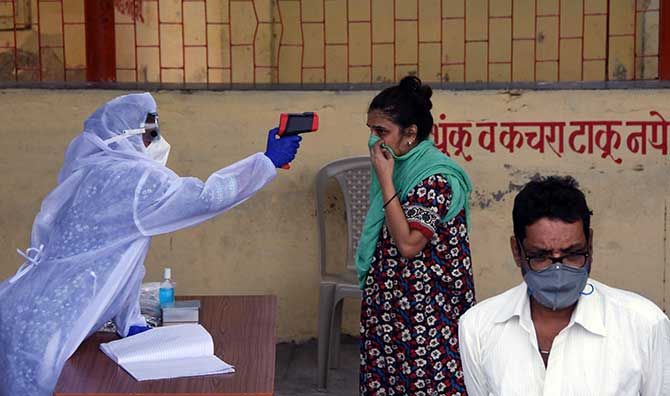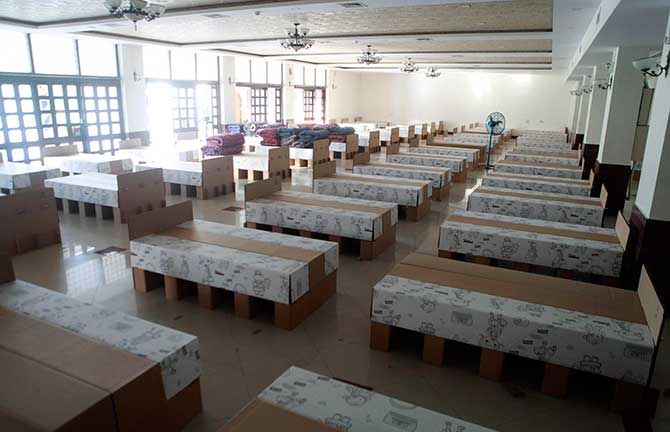'It is not the test, but the symptomatic phase in this disease that really matters.'

"Irrespective of whether you are positive or negative, if you start showing symptoms, if you start experiencing difficulty in breathing, that's the time that's the golden moment, when you must approach a doctor. But what I am again and again stressing is that don't get worried if you have tested positive," Dr Sanjay N Oak, who heads the nine-member team set up by the Maharashtra government to help the state combat the coronavirus pandemic tells Vaihayasi Pande Daniel/Rediff.com
There has been a slight easing of the lockdown, and that easing will probably continue, I imagine, in a very gradual manner, given the current concerns for Mumbai.
What is the kind of planning that is required for the city as it begins to stir itself slowly after the lockdown?
Health is only one aspect of the lockdown.
I would consider this (comparison): Just as we decelerate a car very gradually, and don't apply brakes suddenly, so that it swerves out of control.
It is something similar here, when it comes to how we will have to de-escalate the lockdown.
Schools and colleges, well, must now think of alternative modalities of giving education.
Can we not give this (education) in a virtual manner?
Can we not use our mobile phones, which I think even a toddler uses now, as a medium of learning.

As the vice chancellor of the university (during his tenure at Dr D Y Patil Vidyapeeth, Navi Mumbai) I wrote an article in a university journal on how a mobile can be a medium of education in a university.
Really the time has come when we can use these electronic devices to our advantage.
And you will agree that the younger generation uses them far better than your and my generation.
I think the schools and colleges can open a little later.
In fact, there is a thought that the entire new scholastic year will begin from the first of September.
It is just a thought, but nonetheless it's a thought.
Finally, we have to take care of our next generation.
I don't want them to fall prey to coronas and other illnesses.
So yes, we will think of alternatives.

But first we will think of essential things.
I want the city hospitals to run full steam, which they are not able to run, right now, because people are not able to come to the hospitals to work -- the class 4 people, the nurses.
And why are they not able to come?
Because there's no effective public transport available.
Most of the people who serve in Mumbai, who are required, stay at Kalyan, stay at Badlapur, stay at Vasai, stay at Virar, stay at Nallasopara.
They are unable to come in to work because the locals (trains) are not plying.
Some type of de-escalation, allowing the essential cadre of people to reach their workplaces, will help others to step in and take the matters further ahead.
I think, that should be our strategy.

What do you think, approximately, is the strength of this kind of essential staff, who need transport?
I can answer that by (telling you) how many are actually coming to work.
If I can take my hospital as a unit, it represents what is happening outside.
I have a regular staff of about 900 people, who are on salary structure with us.
And do you know, with how many people I am running my hospital?
Forty-five.
So that is my problem, that is my problem.
I don't want to keep my beds empty.
Because an empty bed is a very difficult proposition for the hospital, as well as for the health sector.
And not at the time when it is most required.
But how would I run the hospital unless and until I have the staff to back them (the beds).
It is impossible.
That is practically happening at every hospital in the public sector, as well as the private sector.

What about the situation with testing? Is it being stepped up enough in the city?
 IMAGE: Dr Sanjay N Oak. Photograph: Kind courtesy sanjayoak/Facebook
IMAGE: Dr Sanjay N Oak. Photograph: Kind courtesy sanjayoak/FacebookThis is an important message I want to give to your readers.
It is not the test, but the symptomatic phase in this disease that really matters.
And I'll explain what I'm saying.
People can continue to remain positive, without any symptoms being developed.
They may not have cough, cold fever, malaise, loss of taste, loss of sensation.
Nothing. They're perfectly normal.
Just because they came into the contact, they tested themselves, the test came positive.
And then they start chasing this test report in their mind.
They repeat the test at five days, eight days, nine days.
'Abhi bhi negative nahin aata (test is still not coming negative)'.
'Na aane doh (let it not come negative).'
'Aapka symptoms agar nahi hai (if you have no symptoms)', you should not worry.

Irrespective of whether you are positive or negative, if you start showing symptoms, if you start experiencing difficulty in breathing, that's the time that's the golden moment, when you must approach a doctor.
COVID-19 tests have remained positive (for an individual) even after three weeks.
Even after four weeks.
But that does not mean that you have enough viral load -- it is called viremia -- within your body to pass on this virus to others.
In fact, after the first seven days, the viremia, the viral load goes down.
So, you can no more communicate the disease to others.
But you remain positive within you.
You may continue to remain positive for four to six weeks also.
But don't worry, don't worry!
The virus may continue to even be excreted via the fecal route into the soil.
That's why there is (the presence of the virus) when you test soil samples, when you want to screen populace at one particular place.
But that does not mean that you are infective.
That only means that you were infected and you carried the virus at some stage.
And the same can be corroborated by doing an antibody test.

So, they should consider later taking an antibody test rather than testing for COVID-19?
Yes.
Subsequently. There are two antibodies -- IgG (immunoglobulin G, the most common antibody in the body that controls infection) and IgM (immunoglobulin M, the first antibody formed in reaction to a virus antigen).
There are antibodies which appear early and there are antibodies which appear later.
Appearance of the later antibody proves that the person has had an infection and now has developed some amount of resistance and therefore is unlikely to fall prey again, as compared to someone who does not have antibodies.
That is what it means.

And these antibody tests are fairly accessible to anybody in Mumbai.
Well, it has limitations.
Obviously, the best test is RT-PCR test (real-time reverse transcription polymerase chain reaction test), which tells us about the antigen (molecular structure on the surface of the virus) and about the infective agent.
Whereas the antibody, as I told you, it demonstrates your resistance that you have developed by now.
But are they accessible?
Like supposing I need to go out right now and do such a test?
The antibody kits have had their early issues and early problems (the kits were found to be unreliable, not just in India), leading to the withdrawal of the entire test kits.
But now new kits are being developed and I'm sure that they will find their place in the market and in clinical medicine, in due course of time.

You are saying that though Mumbai is doing a good job with its testing, one should not be looking at the numbers with regard to testing?
If you look at the South Korean example: I think they perhaps did the maximum number of tests.
The entire populace was subjected to the test.
We have not done in Mumbai that number of tests.
Though in Mumbai we have done maximum number of tests, that one could have thought of conducting in India.
All that I'm saying is that, yes, you can continue to test.
Because once you test then you know the positivity in the community.
But what I am again and again stressing is that don't get worried if you have tested positive.
Worry, if you develop symptoms.
That is important.

Production: Ashish Narsale/Rediff.com











 © 2025
© 2025